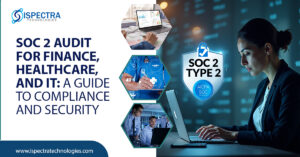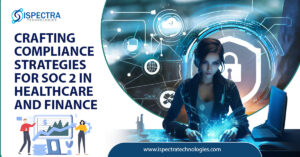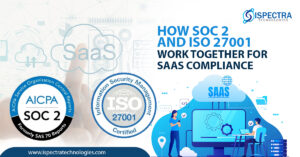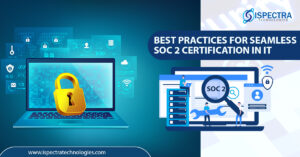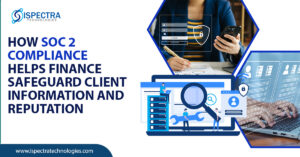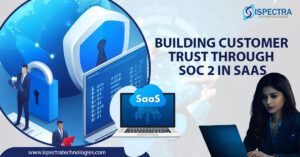Enhancing Trust Through SOC 2 Audit

As the level and frequency of threats increase, security compliance has become essential in technology firms. This pressure has been compounded by enhanced competition and customers’ rising demand on products. Moreover, the exercise of enhanced sets of regulations ensures that security compliance can be considered as a vital performance indicator of these companies.
The SOC 2, specifically, has emerged as popular in the recent past and has turned out as a benchmark in the SaaS industry. According to the AICPA’s Major Organization Survey of over 400 organizations conducted in 2023, it revealed an almost 50% increased demand for SOC 2 report due to increased understanding of the role of IT security.
Here, in this blog, we will discuss on why SOC 2 has become more than just a security asset and is a vital tool for better market positioning, customer trust, and growth perspective.
What is SOC 2 Compliance?
The Service Organization Control 2 (SOC 2) is a program that started in 2010 to describe criteria for managing customer data based on five “trust service principles.” While SOC 2 is not mandatory, organizations adhere to its guidelines to show relevant stakeholders, including customers, regulators, and other partners for maintaining the security and confidentiality of customer data.
Why is SOC 2 Compliance Essential?
The SOC 2 program shifts the auditing responsibility to the system owners or to the vendors. Vendors have mandatory annual security assessments performed by third-party organizations, during which vendors get insights on how their systems work and safeguard the information.
Nowadays, considering the complexity and increasing requirements of any vendor management program, having a SOC 2 report is a must as it:
-
Creates more efficiency in the sales pipeline:
SOC 2 report can be shared with the clients and prospects who need third party access of security controls.
-
Opens new market opportunities and revenue:
Any big company would only invest in software that offers SOC 2 reports.
-
Streamlines third-party risk assessments:
It can be useful to share the report with the clients to consider it as preliminary security assessment.
-
Defines a standardized framework:
SOC 2 draws upon well-established frameworks for security controls and establishes trust.
-
Offers evidence to protect sensitive data:
The report defined the state and procedures for security and the level of the controls implemented by the organisation.
These controls, as defined by the AICPA, are divided into five trust service criteria:
- Security
- Availability
- Confidentiality
- Integrity
- Privacy
Who Does SOC 2 Apply To?
If your organization processes data as part of at least one or multiple information systems, SOC 2 is relevant to you. Assessing operational processes and policies is performed based on the following requirements:
-
Security:
The security principle is defined as the right of system resources to be protected from access by an unauthorized person. The requirements start with access control policies and enforcing the use of firewalls and proceed toward complicated monitoring controls for instance, intrusion detection systems.
-
Availability:
This principle has to do with availability of the system and robustness which is usually defined contractually by; Service Level Agreements (SLA), Recovery Point Objective (RPO), and Recovery Time Objective (RPO).
-
Processing integrity:
Data processing has to be processed, effective, precise, efficient, and certified. As a principle, it works through analyzing and discussing all technical processes and tools confirming the data delivery flow.
-
Confidentiality:
As a result, and depending on contractual and legal obligations, data in general is considered to be confidential and therefore, its access, processing and sharing is limited only to authorized persons (employees, business partners, sub-processors etc.).
-
Privacy:
This set of controls correlates with the privacy principles that have been used to form the foundation of the current privacy regulations including General Data Protection Regulation (GDPR). In addition, it covers in its entirety the Personal identifiable information (PII) and its full cycle – collection, usage for purposes, retention, and deletion.
SOC 2 Compliance Checklist
If you are thinking about getting SOC 2 report in the near future, there are one or two things regarding the timeline that are crucial for you to know.
A SOC 2 Type 2 audit captures how a company operates throughout a period of time: It has to be at least 6 months, but no longer than 18. In general, the market expects full SOC 2 Type 2 reports for the period of one year.
While SOC2 Type 1 reports provide information about the design of security processes at a given period while closely resembling an ISO 27001 audit. If you are not planning this move to Type 2 reports sometime in the future, then type 1 reports can be beneficial. If you need clarification about SOC 2 Type 1 or Type 2 reports, you are recommended to read this article and find out all the information you need.
As part of the SOC 2 implementation process, the first steps should be:
-
Scope:
One of the important steps is clearly define boundaries of your SOC program because only this way you can understand to which teams/departments and processes you are bound to cover.
-
Gap Assessment:
According to the service criteria, the only option that gives an outlook of the existing gaps and the process that may require enhancement is the gap assessment.
-
Select your SOC auditor:
This may seem rather trivial, but you may want to allow more time when it comes to selecting the auditing organization. Secondly, the assessment of synergy and cost and the measure of its impact are obligatory.
-
Mature your processes:
As a reminder, there are unlikely to be evidence of effectiveness if the maturity of processes is being targeted. Again, the other important aspect is to spend time with leaders to get the processes to optimize them and make sure the entire team understands what to do so that it can work.
Conclusion
If you have all the above done, just smile and hit the road for SOC 2 audit. However, it is important to remember that SOC 2 is not a dry checklist exercise. Security is not a one-time solution that, once implemented, will work flawlessly forever. Instead, it is an ongoing process of refining security systems to build trust with your clients and protect the critical information passing through your system.
By exploring the resources mentioned earlier and pursuing SOC 2 compliance, organizations equip themselves with a powerful tool. This tool helps them navigate uncertainty and stay competitive in earning clients’ trust in the digital world.
Categories
- Cloud Engineering (3)
- Cloud Transformation (11)
- Cyber Security Services (24)
- DPDP (3)
- GDPR Consultants (1)
- GDPR Services (6)
- Healthcare (6)
- HIPAA (1)
- ISO 27001 certification (7)
- RCM (1)
- Revenue Cycle Management (1)
- SIEM (2)
- SOC 2 (2)
- SOC 2 Audit (28)
- SOC 2 Certification (1)
- SOC 2 Compliance (16)
- Software Engineering (6)
- Strategic Risk Management (SRM) (2)

